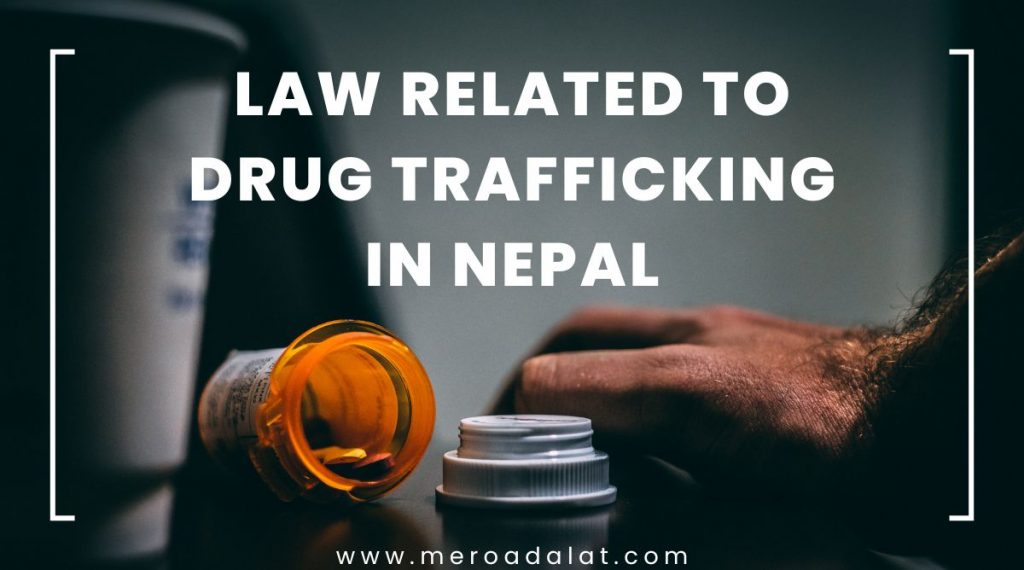This article is all about law related to drug trafficking in Nepal. Here, you can know about the law and punishment relating to the trafficking of drugs.
A drug is any biological substance, that is taken basically for non-dietary use. Drug trafficking is also known as drug distribution. The law related to drug trafficking in Nepal is governed by the Narcotic Drugs(Control) Act, 2033 B.S which was amended in 2055 B.S.

Provision of Narcotic Drugs(Control) Act, 2033 B.S
According to this act, Narcotic drugs means
- Cannabis or marijuana
- Medicinal cannabis or marijuana
- Opium
- Processed opium
- Medicinal opium
- Plants and leaves of coca, and any substances to be made by mixing opium and extract coca, includes mixture or salt.
- Any natural or synthetic narcotic drug or psychotropic substances and their salts and other substances as may be specified by the Government of Nepal by a notification published in the Nepal Gazette, from different time periods.
Illegal Acts according to Narcotic Drugs(Control) Act, 2033 B.S
- Cultivate, produce, prepare, purchase, sell, distribute, export or import, conduct any trafficking, store, or consume cannabis/marijuana,
- Cultivate opium or coca or produce opium or coca leaves or other narcotic drugs,
- Manufacture or prepare narcotic drugs,
- Sell or distribute narcotic drugs,
- Export or import narcotic drugs,
- Purchase, store, possess, or conduct any trafficking of narcotic drugs,
- Consume narcotic drugs other than cannabis or marijuana.

An exception to the illegal acts
The chemical substance to be used for the preparation of narcotic drugs from among the medicines defined in the Single Convention on Narcotic Drugs, 1961 may be exported, imported, stored, conducted trafficking, sold, distributed, and used only in the quantity as prescribed by the Chief.
Any person may use narcotic drugs under certain circumstances:
- Purchase and consumption of narcotic drugs by any person in the recommended dose from any licensed shop on the recommendation of any recognized medical practitioner for the purpose of medical treatment.
- Consumption of narcotic drugs by persons belonging to the prescribed categories in prescribed doses.
Duty of Medical Practitioner
While prescribing narcotic drugs, the medical practitioner shall not prescribe them to those who do not need them or prescribe more than what the requirement is even to those to whom it is required.
Authority Empowered to Issue Warrants
The Narcotic Drugs Control Officer may issue warrants for the arrest and search of any person if he/she has reason to believe that such person has committed or is about to commit any offense punishable under this Act.
The Narcotic Control Officer may issue orders for conducting a search of any building, land, vehicle, or any other place if he/she has reason to believe that any person connected with the offense has been hiding in such building, land, vehicle, or other place or that any narcotic drug has been kept therein.
Law Related to Drug Trafficking in Nepal- Provision of Punishment
- Anyone who consumes cannabis/ marijuana shall be punished with imprisonment for a term of up to one month or with a fine of two thousand rupees.
- Anyone who cultivates twenty-five cannabis/ marijuana plants shall be punished with imprisonment for a term of three months or with a fine of three thousand rupees.
- Anyone who cultivates more than twenty-five cannabis/ marijuana plants shall be punished with imprisonment for a term of three years or with a fine from five thousand to twenty-five thousand rupees.
- Anyone who consumes opium, coca, or any other narcotic drugs made therefrom shall be punished with imprisonment for a term of up to one year or with a fine up to ten thousand rupees.
- Anyone who addicts any natural or synthetic narcotic drugs and psychotropic substances and their salt and other substances, as specified by the Government of Nepal by a notification published in the Nepal Gazette, from time to time, shall be punished with imprisonment for a term up to two months and with a fine up to two thousand rupees or both.
- With imprisonment for a term from two years to ten years and with a fine from one hundred thousand rupees to twenty hundred thousand rupees for anyone who commits any other prohibited acts other than those mentioned in Clause (5) above.
Anyone who produces, prepares, purchases, sells and distributes, exports or imports, traffics and stores, cannabis/ marijuana shall be punished
- With imprisonment for a term of up to three months or with a fine of up to rupees three thousand, if it is up to fifty grams.
- With imprisonment for a term from one month to one year and with a fine from one thousand to five thousand rupees, if it is within fifty grams to five hundred grams.
- With imprisonment for a term from six months to two years and with a fine from rupees two thousand to ten thousand, if it is within five hundred grams to two kilograms.
- With imprisonment for a term from one year to three years and with a fine from rupees five thousand to twenty-five thousand, if it is within two kilograms to ten kilograms.
- With imprisonment for a term from two years to ten years and with a fine from fifteen thousand to rupees one hundred thousand, if it is ten kilograms or more than this.
Anyone who cultivates opium poppy or coca bush shall be punished
- With imprisonment for a term of one year to three years or with a fine of five thousand rupees to twenty-five thousand rupees, in case of the cultivation of twenty-five plants.
- With imprisonment for a term from three years to ten years and with a fine from twenty-five thousand rupees to two hundred thousand rupees in case of cultivation of more than twenty-five plants.
Anyone who commits any other prohibited acts other than consumption of opium, coca, or any other narcotic drugs made therefrom and cultivation of such plants shall be punished
- With imprisonment for a term from five years to ten years and a fine from five thousand rupees to twenty-five thousand rupees for anyone doing transactions up to twenty-five grams.
- With imprisonment for a term from ten years to fifteen years and a fine from seventy thousand rupees to two hundred thousand rupees for anyone doing transactions from twenty-five grams to hundred grams.
- With imprisonment for a term from fifteen years to life imprisonment and with a fine from five hundred thousand rupees to twenty-five hundred thousand for anyone doing a transaction of any quantity more than one hundred grams.
Also Read: Law Related to Human Trafficking
For Answers and Questions
Can police search or seize narcotic drugs without a warrant?
If there is reason to believe that any offense punishable under this Act is being committed in any building, land, vehicle, or other place and that the offender may escape or that evidence of the offense may disappear, the Narcotic Drugs Control Officer or police personnel at least up to the rank of Assistant Sub-Inspector of Police may, after making a record to that effect, take any of the following actions at any time:-
(a) To enter into such building, land, vehicle, or any other place,
(b) To break the gate or resort to other necessary actions if any obstruction is caused to such entry,
(c) To seize all narcotic drugs and other materials connected with the offense, and any other document which may serve as evidence,
(d) To detain and search any person and if necessary, arrest him/her if there is a reason to suspect that such a person has committed an offense.
What is the punishment for the repeated offense in a drug case?
In case any person who had been punished once under this Act again commits any other offense mentioned hereunder, he/she shall be punished for each subsequent offense, in addition to the prescribed punishment, with imprisonment for a term which may extend up to five years and with a fine up to one hundred thousand rupees.

Thanks , Excellent from my point. Constitutunal Rights And The Power Police Have And The Right Which Protects us From Uncostitutional Abuse of power from people in Authority.Should be Common Knowlegde
What if someone use drug and case is repeated two times in a user case?
Kindly Contact/Whatsapp +977-9862944100